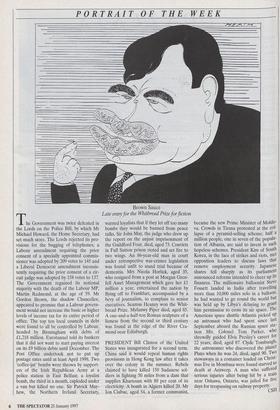PORTRAIT OF THE WEEK
Brown Sauce Late entry for the Whitbread Prize for fiction The Government was twice defeated in the Lords on the Police Bill, by which Mr Michael Howard, the Home Secretary, had set much store. The Lords rejected its pro- visions for the bugging of telephones; a Labour amendment requiring the prior consent of a specially appointed commis- sioner was adopted by 209 votes to 145 and a Liberal Democrat amendment inconsis- tently requiring the prior consent of a cir- cuit judge was adopted by 158 votes to 137. The Government regained its notional majority with the death of the Labour MP, Martin Redmond, at the age of 59. Mr Gordon Brown, the shadow Chancellor, appeared to promise that a Labour govern- ment would not increase the basic or higher levels of income tax for its entire period of office. The top ten local councils in debt were found to all be controlled by Labour, headed by Birmingham with debts of £1,218 million. Eurotunnel told its bankers that it did not want to start paying interest on its £9 billion debts until December. The Post Office undertook not to put up postage rates until at least April 1998. Two `coffee-jar' bombs were thrown by support- ers of the Irish Republican Army at a police station in East Belfast; a loyalist bomb, the third in a month, exploded under a van but killed no one. Sir Patrick May- hew, the Northern Ireland Secretary, warned loyalists that if they let off too many bombs they would be banned from peace talks. Sir John May, the judge who drew up the report on the unjust imprisonment of the Guildford Four, died, aged 73. Convicts in Full Sutton prison rioted and set fire to two wings. An 86-year-old man in court under retrospective war-crimes legislation was found unfit to stand trial because of dementia. Mrs Nicola Horlick, aged 35, who resigned from a post at Morgan Gren- fell Asset Management which gave her £1 million a year, entertained the nation by flying off to Frankfurt, accompanied by a bevy of journalists, to complain to senior executives. Seamus Heaney won the Whit- bread Prize. Myfanwy Piper died, aged 85. A one-and-a-half-ton Roman sculpture of a lioness from the second or third century was found at the edge of the River Cra- mond near Edinburgh.
PRESIDENT Bill Clinton of the United States was inaugurated for a second term. China said it would repeal human rights provisions in Hong Kong law after it takes over the colony in the summer. Rebels claimed to have killed 150 Sudanese sol- diers in fighting 50 miles from a dam that supplies Khartoum with 80 per cent of its electricity. A bomb in Algiers killed 20. Mr Ion Ciubuc, aged 54, a former communist, became the new Prime Minister of Moldo- va. Crowds in Tirana protested at the col- lapse of a pyramid-selling scheme; half a million people, one in seven of the popula- tion of Albania, are said to invest in such hopeless schemes. President Kim of South Korea, in the face of strikes and riots, met opposition leaders to discuss laws that remove employment security. Japanese shares fell sharply as its parliament announced reforms intended to cheer up its finances. The millionaire balloonist Steve Fossett landed in India after travelling more than 10,000 miles solo in a balloon; he had wanted to go round the world but was held up by Libya's delaying to grant him permission to cross its air space. The American space shuttle Atlantis picked tIP an astronaut who had spent since last September aboard the Russian space sta- tion Mir. Colonel Tom Parker, who shrewdly guided Elvis Presley's career for 22 years, died, aged 87. Clyde Tombaugh, the astronomer who discovered the planet Pluto when he was 24, died, aged 90. The stowaways in a container loaded on Christ- mas Eve in Mombasa were found starved to death at Antwerp. A man who suffered serious injuries after being hit by a train near Oshawa, Ontario, was jailed for five days for trespassing on railway propertY- CSH


































































 Previous page
Previous page